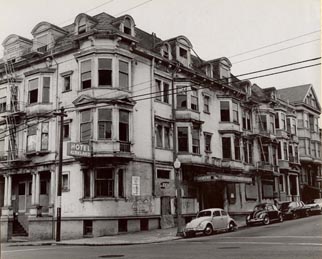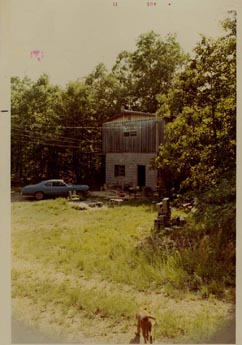
Soon after I returned back to Phoenix from San Francisco in 1969, I met my husband Michael, got married, and made our infamous move to the bluegrass state of Kentucky. The country land was beautiful!Its gently sloping hills and charming old wooden farmhouses cut through the sprawling tobacco fields and the darkness of the forest.We assumed the "Hill" people were family, waiving as we drove by and occasionally stopping by with goodies and Moonshine and a "Hill" story or two.But all was not well in this little slice of heaven.
By that time most people in the U. S. were aware of the Vietnam War, the Civil Rights Movement, the "walk on the moon," and the facts about prohibition, but not so in west Kentucky.How uneducated most Hill people were at that time, for very few had television or radio, many had no electricity, and national news was sparse, if at all.Vast and sprawling farmlands in older established hill communities made it nearly impossible for the migration of outsiders to develop a kinship with these folks. The farmers' cultural traditions were shaped by agriculture and a lingering struggle to survive, where they lived off the fruits of their land and by the seat of their pants, and isolated themselves from land grabbers and foreigners from places beyond.There were countless sexual abuse issues, civil rights problems, neglected children, destitute families, and hateful feuds festering throughout the region.It wasapparent that the Hill people did not want to relinquish their old ways, their prejudiced feelings, and their fears of the outside world, their loutish behavior and their uncivilized lawlessness.It was what they knew best, their form of reality, void of a global environment that dominated the world around them.
Two distinct and different cultures began to edge their way upon each other, constructing a borderland where two worlds would soon collide.The once rural farm life of the native farmer was slowly being taken over by the modern urban world.The metropolitan city folk sought after a taste of the" down home country living," that Kentucky had to offer, while holding dear to the prevailing culture to which they were accustomed.The hill folk, caught on the border of this strange new world, yearned for the status quo, and fought fervently to maintain it.They did not wish to recognize the civil rights of black people, the change in prohibition laws, or migration of a modern society, its 'rich white trash', or its current run of new ideals.I suspect they felt much like the first inhabitants of America, the Native Americans, who were faced with a "new age" crashing in around them.
My husband, Michael, and I settled deeper and deeper into a vicious white community of "outlaws" and "In-laws".If it wasn't the bigoted Brimley's who owned the General Store condemning the Blacks to a certain death, "Those "N"… They should be lined up along the wall and shot", or the "Hatfield's and McCoy's" slowly extinguishing each other, it was moonshine bootlegger Orville Skinner acting as judge and jury against the law: "If you got a 'Still' and the 'Feds' come on yer property, shoot em and bury em.Bury em SIX FEET UNDER!Why we got 'Feds' buried all over this land"(as he waved his hand across the horizon).And there were also drunken Betty, Bubba and the boys circling the wagons to rough up Michael for some new unfounded accusation of rape.All of them had a story to hide and a relentless thirst for blood.The movie "Deliverance" comes to mind when I have to think about it.
We first arrived in March of 1971, and we immediately sensed that the county to which we were moving was "Dry" and "White" since there was no liquor or Blacks to be found.Had we known this before we came, Phoenix would have remained 'home sweet home'.The weeks wore on for Michael and I, and our thirst for a cold beer and a friend kept us searching. After making a few inconspicuous inquiries, but dangerous nonetheless, we found a local bootlegger at a nearby gas station that sent us straight to the Tennessee borderland of bars, saloons, truck stops, and coffee shops six miles away.The shops and bars lined up as far as the eye could see, one right after another.Each one's patrons were unique, those for the farmers, those for the jocks, those for the rednecks, those for the Blacks, those for the students, and those for us.After getting it wrong just once we promptly got educated to the ground rules of "back hill country living", and forever learned our place.
 The
overwhelming thoughts of a culture so disjointed from the modern world
gave me a longing for normal places and familiar faces of home. Enjoyment
was rare, except the few occasions we had with the Lyman's at their farmhouse,
feeding herds of deer when they came to find the salt licks. Throughout
the county, the lands were mostly unfenced, and hunters were prohibited,
so unlike humans, deer felt safe. Mrs. Lyman had only a small fence around
the garden to protect the vegetables from the roaming wildlife. One evening
I asked why she hadn't put up a gate for the garden fence, and she chuckled
loudly, "That poor ole' Mr. Lyman just didn't have the time to mess with
stuff like that!" Fortunately, she had found some old milk boxes to put
up close to the fence as steps. Watching her jovially hop that fence time
and time again was an amusing and eventful experience, and one I still
remember well.
The
overwhelming thoughts of a culture so disjointed from the modern world
gave me a longing for normal places and familiar faces of home. Enjoyment
was rare, except the few occasions we had with the Lyman's at their farmhouse,
feeding herds of deer when they came to find the salt licks. Throughout
the county, the lands were mostly unfenced, and hunters were prohibited,
so unlike humans, deer felt safe. Mrs. Lyman had only a small fence around
the garden to protect the vegetables from the roaming wildlife. One evening
I asked why she hadn't put up a gate for the garden fence, and she chuckled
loudly, "That poor ole' Mr. Lyman just didn't have the time to mess with
stuff like that!" Fortunately, she had found some old milk boxes to put
up close to the fence as steps. Watching her jovially hop that fence time
and time again was an amusing and eventful experience, and one I still
remember well.
I recall Mrs. Lyman as a stoutly, but kind, old woman with a pronounced limp, a keen sense of "country ways," and a sincere, however toothless smile.Mr. Lyman was a slender and aged man, ornery as hell, but mostly quiet, leaving most to be said by his adorned better half.As we parleyed about with the stories of hill life, Mr. Lyman would usually just grin and take gaze of the livestock over his thick bowed glasses, kept there by his only ear; and I would feel warm and safe inside, if just for that moment.
Mr.
Orville Cook, a local farmer and Christian family man, was the only Black
man I met around those parts.He
was caring and gentle, a soft-spoken man with a pleasant touch as he lent
a helpful hand, held no bitterness towards the ruling class, and possessed
a spirit of love. There was no Black housing in the main parts of town,
as most White folk would not have permitted it being that some Whites still
had them "kept" as servants in the sheds behind their homes.I
seriously doubted that the Blacks cared to live amongst their White neighbors
anyway, for they recognized their fate, and spent their lives accordingly.Since
most Black folk did not venture far from their homes, and never near my
town, I don't remember the occasion we first met, but I will always remember
Mr. Cook's gaze.As
we did several times before, we'd walked through the woods and chat about
life.On one occasion he offered
me his thoughts from the deepest part of himself, "There is an unspoken
word in these hills and I definitely know what it means.I
don't want what they have, or to walk in their place, I just stay on my
own path, in my own shoes, and be happy that they fit me best."
The Brimley's General Store, the only store within a 50 mile radius, offered groceries, a post office, gas pumps, feed and seed supplies, and of course, night crawlers and buckshot for your fishing and hunting needs.For a while, Brimley's store was my harbor when I needed nurturing and essentials for the home.The Brimley's were a lovable old couple, loved by all the folks around town, and surely made us feel welcome in our isolation so far from our past.
Regrettably, my introduction into racism came just six months after our arrival.I remember the morning at Brimley's store vividly.Mrs. Brimley greeted me with a friendly "good morning", a smoked slab of maple-cured bacon and her coveted pastry goods.I sat on the porch bench, enjoying the plump warm dumpling oozing with peaches, and listened to her forbearing voice as she welcomed our new son and offered up the weekly "gossip" report.At one point in the conversation I interjected something about my new friend Mr. Cook, when suddenly… all hell broke loose.Mrs. Brimley's demure facial expressions contorted to a "Dr. Frankenstein's monster in drag" as she regurgitated Mr. Cook's name in vain, yelling "That "N"…… and all his kind!They should be lined up along the wall and shot.Wasn't too long ago those "N's" lived in our slave houses out back" (as she pointed to the old sheds in the south part of her farm)."What a crime it was to release them "N's".Some of us "kept" them even up until just a few years ago, and some still have 'em there today."Hate poured from her mouth for several minutes as she choked out her distain of "N's" and poor Mr. Cook.You could have run me over with a train for all I felt inside!My mind was spinning with disbelief!Did I just hear this sweet old woman in this lovely little old town say what I think I heard her say???
Life
in the hills of Kentucky regressed quickly for Michael and me, and we found
ourselves not only longing for the sanity of a homeland 1200 miles away,
but also packing our bags for the next chance to go.Thirty-five
years have passed and the memories of Mrs. Brimley are still alive in me.The
incident forced me many times to take a hard look at the world and the
people in it, and recognize that racism does exist in many places and in
many ways.Fortunately, my other
familiar "rememory" of the "Streets Called Love," recurs just as often
and I work had to sustain this memory through visits and thoughts of a
better time and place.